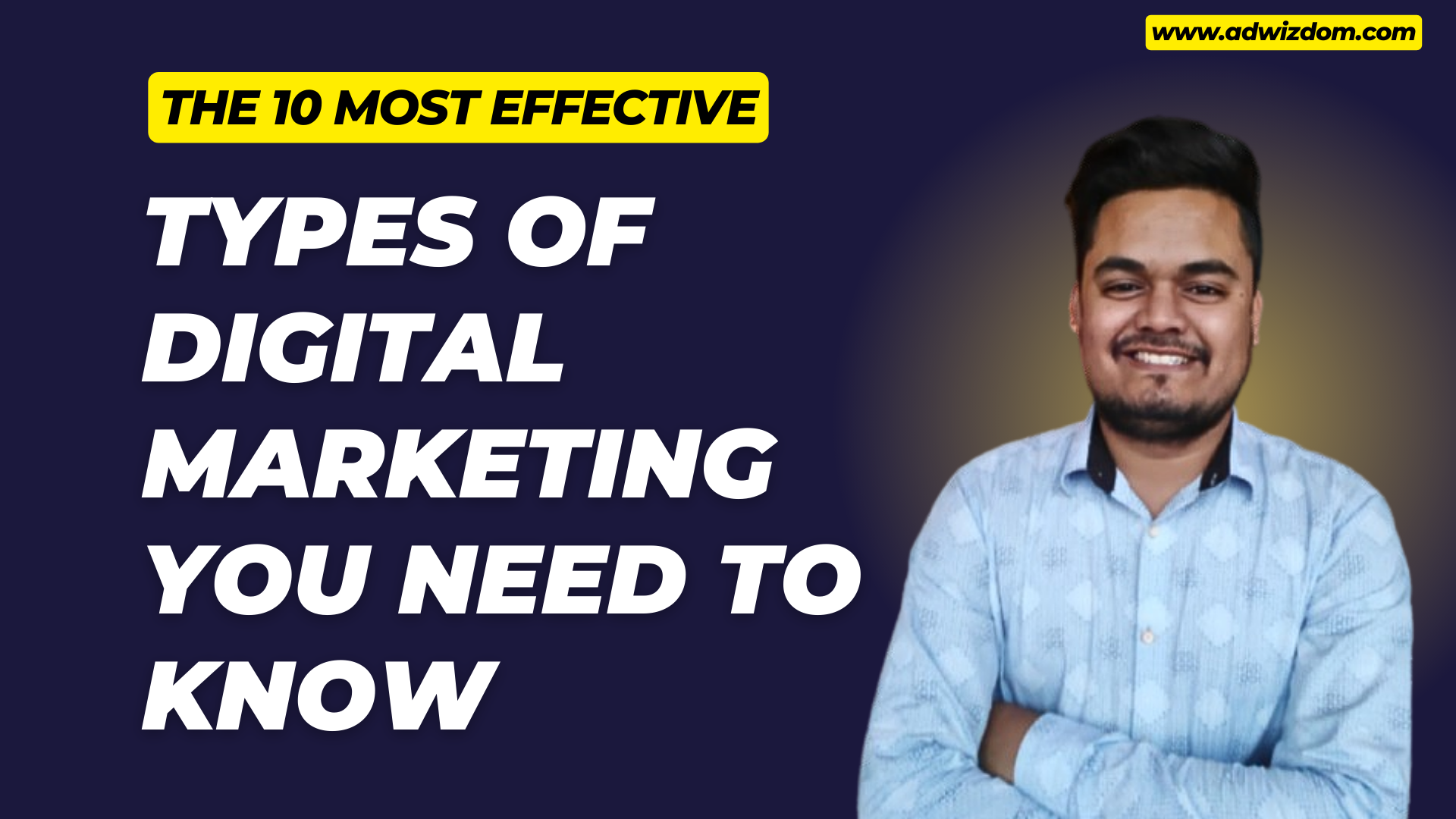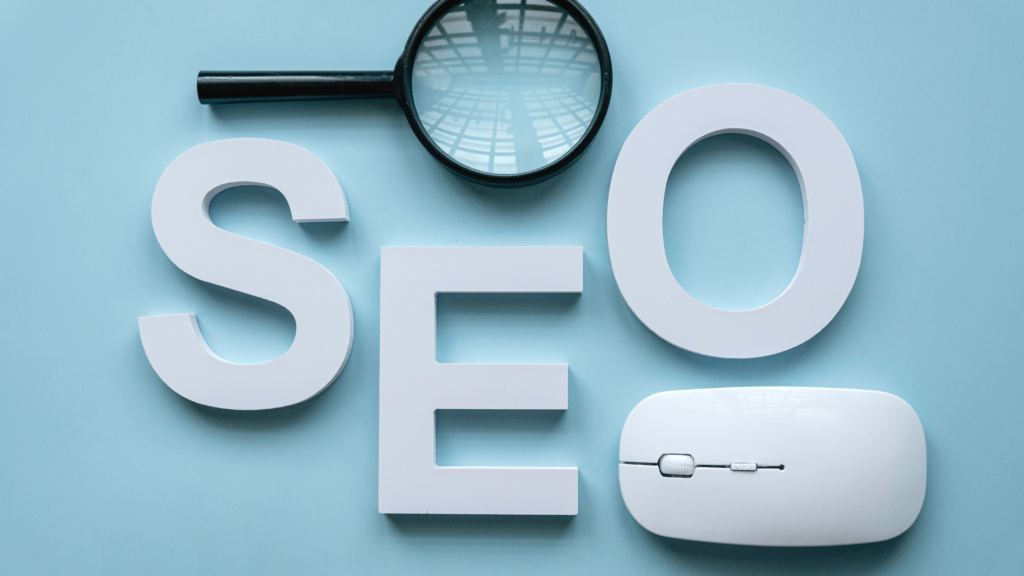The 10 Most Effective Types of Digital Marketing You Need to Know

Introduction
Types of digital marketing encompasses all marketing efforts that use the internet or an electronic device. Businesses leverage digital channels such as search engines, social media, email, and websites to connect with current and prospective customers. The importance of digital marketing in today’s world is paramount as it allows businesses to reach a larger audience, target specific segments, and measure the impact of their marketing efforts in real-time.
Search Engine Optimization (SEO)
What is SEO?
Search Engine Optimization (SEO) is the practice of optimizing a website to rank higher in search engine results pages (SERPs), thereby increasing the quantity and quality of traffic to the site. It is very important factor in types of digital marketing SEO focuses on improving organic search results, which are the unpaid listings on a SERP.

On-Page SEO
On-Page SEO refers to the optimization of individual web pages to rank higher and earn more relevant traffic. This includes optimizing content, HTML code, and the overall user experience.
Off-Page SEO
Off-Page SEO involves activities outside of the website to improve its ranking. This primarily includes building backlinks from other reputable sites and increasing social signals.
Technical SEO
Technical SEO focuses on the backend structure of a website, ensuring it meets the technical requirements of search engines. This includes optimizing site speed, mobile-friendliness, and secure connections (HTTPS).
Benefits of SEO
SEO offers numerous benefits including increased visibility, higher web traffic, better user experience, and improved brand credibility. It is cost-effective in the long run and provides measurable results through analytics.
Common SEO Tools
Popular tools used in SEO include Google Analytics, Google Search Console, SEMrush, Ahrefs, and Moz. These tools help in keyword research, competitor analysis, backlink tracking, and performance measurement.
Content Marketing
Definition of Content Marketing
Content marketing involves creating and distributing valuable, relevant, and consistent content to attract and engage a clearly defined audience. The ultimate goal is to drive profitable customer action. It is crucial part in types of digital marketing efforts.

Types of Content Marketing
Blog Posts
Blog posts are articles that provide information, insights, and tips related to a specific topic. They help in improving SEO, establishing authority, and engaging readers.
Videos
Videos are a powerful form of content that can convey messages effectively through visuals and audio. They can range from explainer videos to product demonstrations.
Infographics
Infographics are visual representations of information or data. They are engaging and easy to understand, making complex information more accessible.
Ebooks
Ebooks are long-form content that provides in-depth information on a specific topic. They are often used as lead magnets to collect contact information from potential customers.
Benefits of Content Marketing
Content marketing helps in building trust and credibility, improving SEO, generating leads, and nurturing customer relationships. It also positions the business as an industry leader.
Content Marketing Strategies
Effective content marketing strategies include understanding the target audience, creating a content calendar, using SEO best practices, and promoting content through various channels like social media and email.
Social Media Marketing (SMM)
What is Social Media Marketing?
Social Media Marketing (SMM) involves using social media platforms to promote products, services, and brands. It helps in building brand awareness, engaging with customers, and driving traffic to the website. When it comes to connect with customer or consumer of business social media marketing is great step which is a part in types of digital marketing process.

Popular Social Media Platforms
Facebook is the largest social media platform, offering various advertising options and tools to engage with users through posts, stories, and groups.
Instagram focuses on visual content like photos and videos. It is popular among younger audiences and is effective for influencer marketing.
Twitter is a microblogging platform that allows sharing short messages, links, and multimedia. It is useful for real-time updates and customer service.
LinkedIn is a professional networking platform. It is effective for B2B marketing, networking, and recruiting.
Benefits of Social Media Marketing
SMM enhances brand awareness, increases website traffic, generates leads, and fosters customer relationships. It also provides valuable insights through analytics.
Social Media Marketing Strategies
Successful SMM strategies include identifying the right platforms, creating engaging content, using paid advertising, and leveraging analytics to optimize performance.
Pay-Per-Click Advertising (PPC)
What is PPC?
Pay-Per-Click (PPC) is an online advertising model where advertisers pay a fee each time their ad is clicked. It is a way of buying visits to the site rather than earning them organically.
How PPC Works
PPC ads are typically displayed on search engine results pages, social media platforms, and other websites. Advertisers bid on keywords, and the ads are shown based on the bid amount and ad quality. If you miss this types of digital marketing then you are missing the fast business growth.
Types of PPC Ads
Search Ads
Search ads appear on search engine results pages when users search for specific keywords.
Display Ads
Display ads are shown on various websites within the Google Display Network. They can be in the form of banners, images, or text.
Social Media Ads
Social media ads are displayed on social platforms like Facebook, Instagram, and Twitter. They can be targeted based on user demographics and behavior.
Benefits of PPC
PPC provides immediate results, precise targeting, measurable performance, and control over ad spend. It can significantly increase visibility and drive traffic to the site.
PPC Strategies
Effective PPC strategies include thorough keyword research, creating compelling ad copy, optimizing landing pages, and continuously monitoring and adjusting campaigns.
Email Marketing
What is Email Marketing?
Email marketing involves sending commercial messages to a group of people via email. It is used to build relationships with potential and existing customers, promote products, and provide valuable information. It is most used and most conversion given marketing method in types of digital marketing.

Types of Email Marketing Campaigns
Newsletters
Newsletters are regular emails that provide updates, news, and valuable content to subscribers.
Promotional Emails
Promotional emails are sent to inform subscribers about special offers, discounts, and new products.
Transactional Emails
Transactional emails are triggered by user actions, such as order confirmations, password resets, and shipping notifications.
Benefits of Email Marketing
Email marketing is cost-effective, highly targeted, measurable, and customizable. It helps in building relationships, increasing brand awareness, and driving sales.
Email Marketing Strategies
Successful email marketing strategies include building a quality email list, segmenting the audience, personalizing content, and using automation tools for timely delivery.
Affiliate Marketing
What is Affiliate Marketing?
Affiliate marketing is a performance-based marketing strategy where businesses reward affiliates for driving traffic or sales through their marketing efforts. Affiliate marketing is latest types of digital marketing in these decade.
How Affiliate Marketing Works
Affiliates promote a business’s products or services through their channels (e.g., blogs, social media) and earn a commission for each sale or lead generated.
Types of Affiliate Marketing Programs
Affiliate programs can be pay-per-sale, pay-per-click, or pay-per-lead. The type of program depends on the business’s goals and the nature of the product or service.
Benefits of Affiliate Marketing
Affiliate marketing expands reach, increases sales, and is cost-effective since businesses only pay for actual conversions. It also builds partnerships with influencers and publishers.
Affiliate Marketing Strategies
Effective strategies include choosing the right affiliates, providing them with quality promotional materials, tracking performance, and offering competitive commissions.
Influencer Marketing
What is Influencer Marketing?
Influencer marketing involves partnering with influencers—individuals with a large following on social media or other platforms—to promote products or services. With new strategies types of digital marketing are changing and adapting new techniques as per industry requirement.
Types of Influencers
Mega-Influencers
Mega-influencers have over a million followers and significant reach. They are usually celebrities or well-known personalities.
Macro-Influencers
Macro-influencers have 100,000 to 1 million followers. They are typically industry experts or well-known figures in their niche.
Micro-Influencers
Micro-influencers have 1,000 to 100,000 followers. They have high engagement rates and a strong connection with their audience.
Nano-Influencers
Nano-influencers have less than 1,000 followers but possess high engagement and influence within a very specific niche.
Benefits of Influencer Marketing
Influencer marketing builds trust, reaches a targeted audience, improves brand awareness, and generates high-quality leads.
Influencer Marketing Strategies
Successful strategies include identifying the right influencers, creating authentic content, setting clear goals, and tracking performance metrics.
Video Marketing
What is Video Marketing?
Video marketing involves using videos to promote and market products or services, increase engagement, and educate consumers. Video marketing is old marketing method but in digital era it is also included in types of digital marketing.
Types of Video Marketing
Brand Videos
Brand videos showcase the company’s mission, values, and products, aiming to build brand awareness and trust.
Product Videos
Product videos demonstrate how a product works, its features, and its benefits, helping potential customers make informed decisions.
Explainer Videos
Explainer videos provide detailed information on how to use a product or service, often addressing common questions and concerns.
Testimonials
Testimonial videos feature satisfied customers sharing their experiences, helping to build credibility and trust.
Benefits of Video Marketing
Video marketing increases engagement, improves SEO, enhances customer understanding, and boosts conversion rates.
Video Marketing Strategies
Effective strategies include creating high-quality content, optimizing videos for search engines, using compelling thumbnails, and promoting videos on various platforms.
Mobile Marketing
What is Mobile Marketing?
Mobile marketing involves reaching consumers on their smartphones, tablets, and other mobile devices through various channels such as SMS, apps, and mobile websites. World is using smartphones and mobiles as it has become part of their life to become one of the best in types of digital marketing.
Types of Mobile Marketing
SMS Marketing
SMS marketing involves sending promotional messages via text messages. It is highly effective due to its high open rate.
In-App Marketing
In-app marketing refers to advertisements and promotions within mobile apps. It targets users based on their app usage behavior.
Mobile Search Ads
Mobile search ads are displayed on mobile devices when users perform searches on search engines like Google.
Benefits of Mobile Marketing
Mobile marketing provides direct and immediate communication, high engagement rates, and the ability to target users based on location and behavior.
Mobile Marketing Strategies
Successful mobile marketing strategies include optimizing websites for mobile, using responsive design, leveraging location-based marketing, and creating mobile-friendly content.
Marketing Analytics
What is Marketing Analytics?
Marketing analytics involves measuring and analyzing marketing performance to improve effectiveness and optimize return on investment (ROI). Every marketing campaign is successful until it is reflected in marketing analytics so that it is considered as types of digital marketing.
Types of Marketing Analytics
Descriptive Analytics
Descriptive analytics looks at historical data to understand what happened and why.
Predictive Analytics
Predictive analytics uses statistical models and machine learning techniques to predict future outcomes based on historical data.
Prescriptive Analytics
Prescriptive analytics recommends actions to achieve desired outcomes by analyzing data and predicting the effects of different strategies.
Benefits of Marketing Analytics
Marketing analytics provides insights into customer behavior, helps in making data-driven decisions, improves campaign effectiveness, and increases ROI.
Marketing Analytics Tools
Popular tools include Google Analytics, Adobe Analytics, HubSpot, and Tableau. These tools offer features for data collection, analysis, and visualization.
Conclusion
Digital marketing encompasses various strategies and techniques to connect with customers online. It includes SEO, content marketing, social media marketing, PPC, email marketing, affiliate marketing, influencer marketing, video marketing, mobile marketing, and marketing analytics as types of digital marketing. Each type has its own benefits, methods, and tools that can help businesses reach their goals.
The Future of Digital Marketing
The future of digital marketing and types of digital marketing is bright and continuously evolving. Emerging technologies such as artificial intelligence (AI), machine learning, virtual reality (VR), and augmented reality (AR) are set to revolutionize how businesses engage with customers. Personalization will become more advanced, allowing for highly tailored marketing messages. Additionally, as privacy concerns grow, marketers will need to balance personalization with data protection and transparency.
What is digital marketing?
Digital marketing refers to all marketing efforts that use the internet or an electronic device. Businesses leverage digital channels like search engines, social media, email, and websites to connect with current and prospective customers.
Why is digital marketing important?
Digital marketing is crucial because it allows businesses to reach a larger audience, target specific segments, and measure the impact of their marketing efforts in real-time. It also provides opportunities for engagement and relationship building with customers.
What is SEO and why is it important?
SEO, or Search Engine Optimization, is the practice of optimizing a website to rank higher in search engine results pages. It is important because it increases the visibility of a website, driving more organic traffic and improving credibility.
What are the benefits of social media marketing?
Social media marketing enhances brand awareness, increases website traffic, generates leads, and fosters customer relationships. It also provides valuable insights through analytics.
What is the difference between PPC and SEO?
PPC (Pay-Per-Click) is an online advertising model where advertisers pay each time their ad is clicked, while SEO focuses on optimizing a website to rank higher organically in search engine results. PPC provides immediate results, whereas SEO is a long-term strategy.

Leave a Reply